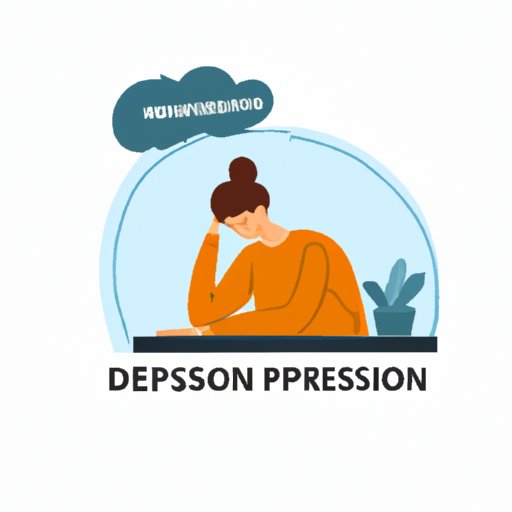
Introduction
Depression is a mental health disorder that can affect anyone, regardless of their age, gender, or background. It is a common and serious condition that can significantly impact one’s life by interfering with work, relationships, and daily activities. Recognizing the signs of depression is essential for early intervention and treatment, which can prevent the condition from worsening. In this article, we will explore how to identify signs of depression and how to seek help.
5 Tell-Tale Signs That You May Be Struggling with Depression
Depression manifests differently for each individual. However, there are common symptoms that can indicate the presence of depression.
- Feelings of sadness or hopelessness – Persistent feelings of sadness, despair, or hopelessness, without any apparent reason, may be a sign of depression. It can cause a loss of interest or pleasure in activities that one typically enjoys.
- Changes in appetite and sleep patterns – A decrease or increase in appetite or sleep can indicate depression. Depression can cause either too much or too little sleep, appetite changes, or both.
- Irritability, anger, or aggressiveness – Depression can lead to an increase in irritability, frustration, and temper. This symptom can be most apparent in men who tend to express their depression through anger or aggressive behaviour.
- Loss of energy and motivation – Depression can zap energy and motivation, making it challenging to do daily chores or tasks.
- Thoughts of self-harm or suicide – These thoughts or behaviours should be taken seriously and are a clear indication of severe depression. It is essential to seek immediate help when experiencing suicidal thoughts, even if it feels overwhelming to ask for assistance.
For instance, if someone has always enjoyed cooking and suddenly find themselves without an appetite or not interested in preparing meals, it could be a sign of depression.
If someone suddenly loses or gains weight without any apparent reason, it could signify depression. Similarly, if someone is sleeping more than usual or having trouble falling or staying asleep, it could be a sign of depression.
If someone starts to snap or become short-tempered towards themselves or others, it could indicate an underlying depression issue. It is essential to recognize behavioural changes in oneself or someone else and identify their source.
For instance, someone who is usually active and engaged may suddenly experience a lack of motivation to go to work or school. This change can result in job loss, drop in academic performance, or withdrawal from social activities.
If someone notices that they frequently have thoughts of suicide or self-harm or observes someone else who is experiencing these thoughts, they should seek immediate medical attention.
Understanding the Symptoms of Depression: How to Recognize if You’re Affected
Depression affects brain chemistry and can cause changes in mood, appetite, and energy levels. These symptoms can persist for several weeks, months, or longer.
It is essential to recognize other symptoms when diagnosing depression, such as:
- Physical symptoms such as headaches, stomachaches, back pain, and fatigue.
- Difficulty concentrating, remembering information or making decisions.
- Feelings of guilt, worthlessness, or helplessness.
- Loss of interest in sex or other enjoyable activities.
- Withdrawal from family, friends, or social events.
If one finds that these symptoms have persisted for two weeks or more, they should seek medical attention.
Is It Depression? Here’s How You Can Tell
Diagnosis of depression requires a comprehensive evaluation conducted by a medical professional—typically a physician or psychiatrist. The health care provider will evaluate the medical history, conduct a physical examination, and use various assessment tools to diagnose depression.
Examples of assessment tools that a health care provider might use to assess depression include:
- Structured Clinical Interview for DSM-5 (SCID)
- Hamilton Rating Scale for Depression (HAM-D)
- Beck Depression Inventory
- Geriatric Depression Scale (GDS)
It is essential to understand that seeking medical attention for depression can sometimes feel like a daunting task. However, early diagnosis and treatment can have beneficial outcomes.
The Quiet Battle: How to Identify Signs of Depression in Yourself
Many people do not realize they are struggling with depression. It is crucial to acknowledge and identify symptoms of depression, just as it is essential to take care of one’s physical health.
Strategies to identify and acknowledge symptoms of depression include:
- Documenting feelings of sadness and changes in mood and behaviours. This documentation can help identify patterns and changes in mood, behaviours, and emotions that could indicate depression.
- Engaging in self-care activities and prioritizing mental wellness by taking deep breaths, practising yoga, exercise, journaling, and maintaining healthy eating habits. These activities can help improve mood and boost self-esteem.
- Seeking support from family, friends, or a support group. Relationships can have an immense impact on one’s mood and overall well-being. Talking to someone and finding support can help overcome feelings of isolation due to depression.
Breaking the Stigma: How Recognizing Depression Symptoms Can Help You Seek Treatment
Stigma and denial can prevent people from seeking help for depression. It is essential to note that depression is a treatable condition, and successful treatment outcomes are attainable. The first step towards seeking help is acknowledging the presence of the condition and recognizing the symptoms.
There are several resources available, including:
- National Suicide Prevention Lifeline-0800-273-8255 or visit suicidepreventionlifeline.org
- Depression and Bipolar Support Alliance at dbsalliance.org
- The Trevor Project at thetrevorproject.org/help/
- The Anxiety and Depression Association of America at adaa.org
- Your primary care physician or mental health professional for treatment options.
Conclusion
Depression can have a profound impact on an individual’s mental and physical health, relationships, and daily life. It is essential to recognize the signs of depression to prevent the condition from worsening and seek medical attention as early as possible. We encourage anyone who experiences any symptoms of depression to seek medical attention and acknowledge that depression is treatable.




